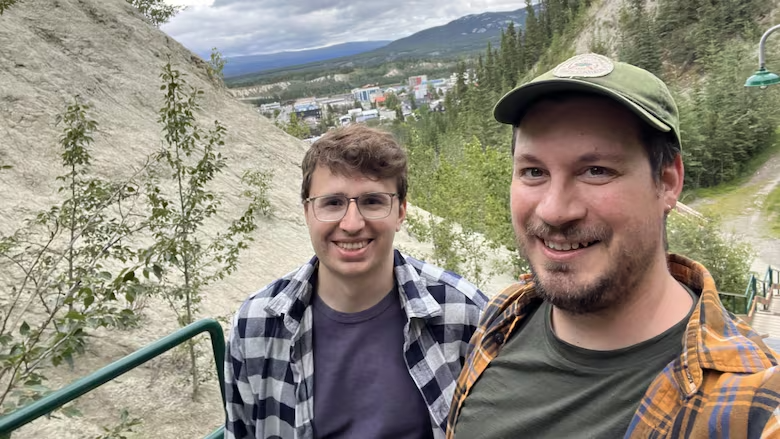Do you speak Yukon English? These researchers want to hear it

‘Linguists know very, very little about what’s going on with Englishes in the Canadian North,’ researcher says
As research projects go, it sounds pretty skookum.
Derek Denis, an associate professor of linguistics at the University of Toronto, is in the Yukon this week listening to how people talk. It’s part of an ongoing research project to better understand and document regional dialects of Canadian English.
“Right now, the most … ‘accurate’ map, dialect map of Canada, it has cut off the territories,” he said. “I’d like to change that.”
His research team is in Whitehorse looking for volunteers to, essentially, shoot the breeze a bit.
“We just wanna talk to them, hear their stories, and then later, down the road, do some linguistics with those recordings,” he explained. “And we also get people to read a short story, and a list of words as well.”
Everything from the use of “outside” to pronunciation
Denis says he’s long been fascinated by how languages evolve over time, in different geographical areas and among different cultures.
“The idea that multiple languages could be related to some long-gone language blew my mind and sparked a lifelong interest in language change,” he writes on his website.
Now, he teaches about the different ways the English language is used and heard in different parts of the world, from Europe to Africa to Asia. He said the dialects in many regions have been well-studied, but it’s a different story in North America.
“It turns out linguists know very, very little about what’s going on with Englishes in the Canadian North,” he said.
Denis is not just interested in the quirks of local vocabulary — for example, the way Yukoners might use “outside” to refer to areas beyond the territory — but also things like pronunciation. He cites the linguistic phenomenon of “Canadian raising,” which refers to a distinct, supposedly signature Canadian way of saying some vowel sounds (often mocked as “oot and aboot”).
“I’m really curious about that, if that’s happening up here as well,” he said.
He admits that a lot of research over the years has involved that most famous Canadianism — “eh” — but after a couple of days in the Yukon, he said he hasn’t heard it used much.
“Not saying it’s not here. I’m gonna be listening out for it,” he said.
Unique migration history
For Denis, the notion of a distinct sort of “Yukon English” intrigues him because of the territory’s unique history of settlement.
“The migration history here is very different from elsewhere in western Canada, and so those influences are coming together in different ways,” he said.
He’s also aiming to continue his research beyond the Yukon, by studying the varieties of English usage in the N.W.T. and Nunavut as well.
In the meantime, he’s hoping to hear from as many Yukoners who might be interested in speaking to his team over the next few days. He said people can contact him through his website — but that right now, they’re only looking for people who were raised in the territory.
“Other than that, no real restrictions, any age. If you want to participate, we’d be happy to talk to you,” he said.
With files from Elyn Jones
Related stories from around the North:
Canada: Mark Indigenous languages decade by making Inuktitut official in Canada: Inuit UN rep, The Canadian Press
Finland: Everyone encouraged to boost Sami language visibility in Finland, Norway and Sweden this week, Eye on the Arctic
Norway: Indigenous and minority language names for Norway now have official status, The Independent Barents Observer
Russia: German project to house everything published in Siberian and Arctic languages to seek new funding, Eye on the Arctic
Sweden: Can cross-border cooperation help decolonize Sami-language education, Eye on the Arctic
United States: Inuit leaders applaud UN move to designate International Decade of Indigenous Languages, Eye on the Arctic



